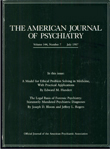Association Between Catechol O-Methyltransferase Genotype and Violence in Schizophrenia and Schizoaffective Disorder
Abstract
OBJECTIVE: The authors previously reported a relationship between an allele encoding the low activity variant of catechol O-methyltransferase (COMT) and aggressive behavior in schizophrenic patients. This study replicates and extends these findings by using more direct measures of violent behavior. METHOD: Fifty-five white patients (34 men, 21 women) with DSM-IV diagnoses of schizophrenia or schizoaffective disorder were selected to form two groups (violent and nonviolent) on the basis of history of aggressive behavior. COMT genotypes were determined by restriction fragment length polymorphism analysis. RESULTS: A significant association was found between COMT genotype and history of violent behavior. Sixty-four percent of patients homozygous for the low-activity COMT allele were violent; 80% of patients homozygous for the high-activity allele were nonviolent. CONCLUSIONS: The gene determining the activity of an important regulatory enzyme in catecholamine inactivation is associated with violent behavior in patients with schizophrenia and schizoaffective disorder.



